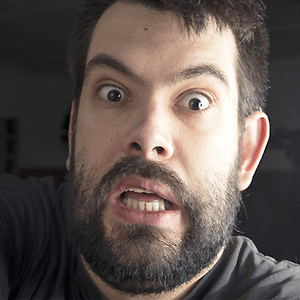
"For me, a panic attack is almost a violent experience. I feel like I'm going insane. It makes me feel like I'm losing control in a very extreme way. My heart pounds really hard, things seem unreal, and there's a powerful feeling of impending doom. Between attacks there's dread and anxiety that it's going to happen again. It can be very debilitating, trying to escape those feelings of panic," says Brian.
Like other people who experience panic attacks, Brian has feelings of terror that strike suddenly and repeatedly without warning. Such people can't predict when an attack will occur, and many develop intense anxiety between attacks, worrying when and where the next will strike.
When a panic attack strikes, typically the heart pounds and people may feel sweaty, weak, faint or dizzy. The hands may tingle or feel numb, and they might feel flushed or chilled. They may have chest pain or smothering sensations, a sense of unreality, or fear of impending doom or loss of control. They may believe they're having a heart attack or stroke, losing their mind, or are on the verge of death. Attacks can occur at any time, even during non-dream sleep.
These attacks are far more common than thought and affect 15% of the population. It is far more prevalent in women than in men: 16% of women have panic attacks, as opposed to 9% of men. It is unfortunately an illness of younger people (adolescents and young adults) which means that people live with this illness for a very long time.
Panic attacks shouldn’t be taken lightly. A total of 4.7% of people who experience these attacks develop panic disorder, an anxiety disorder characterised by severe, recurring panic attacks. It is far more disabling than most other psychiatric illnesses. Sufferers are also at an increased risk of committing suicide. Twice as many people commit suicide than people with other psychiatric illnesses.
There are several causal factors, including general medical conditions such as diabetes, asthma and thyroid problems; substances, especially stimulants and hallucinogenics; medication; or several other psychiatric disorders such as anxiety and mood disorders.
Start low, go slow and aim high
"Most people benefit from a combination of cognitive behavioural therapy. But the sad thing is that most people don’t seek treatment,” said Cape Town psychiatrist Dr Volker Hitzeroth at a recent Panic Disorder workshop hosted by the South African Depression and Anxiety Group (SADAG). “Only a third seek treatment in the first year of their illness, and some wait years before seeking help."
During a visit to a doctor, he or she should first establish whether the symptoms are not due to a medical condition. If it isn't, a detailed psychiatric history should be taken, followed by specific tests such as blood tests.
“'Start low, go slow and aim high' is my motto when treating people who have panic attacks,” Hitzeroth said. This means that you start on a low dose, slowly increase it with the aim of reaching an optimal dose.
Hitzeroth recommends starting with first-line treatment - usually the antidepressants Serotonin Reuptake Inhibitors (SSRIs) and Serotonin and Noradrenalin Reuptake Inhibitors (SNRIs). Common drugs in these groups are Aropax, Zoloft, Cipramil and Prozac. Generics are available for all of them. These drugs don't work immediately. It may take eight to 12 weeks to have an effect. It is recommended that people stay on medication for at least a year or two. Treatment should only be stopped under medical supervision. All of the SSRIs and SNRIs work, but have different side-effects. These usually abate after a few weeks.
If this doesn't work, tricyclics which are older antidepressants, may be used. None of these drugs are addictive or will change a person's personality.
The tranquillisers benzodiazepines such as Valium, Alzam, Ativan and their generics provide short-term relief, but should only be used in emergencies as they are highly addictive.
Look out for these symptoms
During a panic attack some or all of the following symptoms occur:
- Sense of being overwhelmed by fright and terror with accompanying physical distress for between four and six minutes.
- Racing or pounding heart
- chest pains
- Dizziness
- Light-headedness
- Nausea
- Difficulty breathing
- Tingling or numbness in the hands
- Flushes or chills
- Sense of unreality
- Fear of losing contro, going "crazy", or doing something embarrassing
- Fear of dying
Where to go for help
If you are concerned that you might be experiencing a panic attack, you can consult your general practitioner, a specialist or an Emergency Unit. SADAG also runs a helpline: 0800 70 80 90 or sms 31393.




 Publications
Publications
 Partners
Partners














